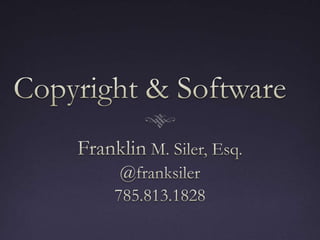
Why Understanding Copyright is Important
- 4. Who cares about copyright? You should care because your decisions influence such factors as: How others can legally use your software If your own projects become “infected” by a license you didn’t choose Whether you must distribute source code if you distribute or even use software to serve up content How others can use your photos on Flickr and other sources Understanding how Wikipedia and other open references work Whether you get sued for a LOT of money.
- 5. How much is a lot? See the TED talk entitled “The $8 Billion iPod”. Theoretically, up to $150,000 per instance.
- 6. Not covered here…. The many flavors of patents Trademarks Trade Secrets Contract law Cat videos
- 7. Jurisdiction matters This talk is focused around the United States. Within the U.S., copyright law is consistent between states because it is federal law and cannot generally be modified by the states. In fact, copyright law is relatively consistent worldwide because of the multitude of treaties concerning it, though some countries are more selective about enforcement than others. However, other types of “intellectual property”, such as trade secrets, may vary from state to state in the U.S.
- 8. What is Copyright? Federal law, with a lot of influence from international treaties (Universal Copyright Convention, Geneva Phonograms Convention, Berne Convention, WTO Agreement, WIPO Copyright Treaty, WIPO Performances and Phonograms Treaty) Authority for Congress to regulate is spelled out in the Constitution
- 9. What you need for Copyright A literary, musical, dramatic, pantomime, choreographic, pictorial, graphic, sculptural, motion picture, audiovisual, sound recording, or architectural work The work must be in a “fixed medium” Source code qualifies 17 USC §117 outlines special rights for software rights holders
- 10. What is a license? Most generally, permission to do something: e.g. practice law, drive a car, or operate an amateur radio station Copyright licenses are more or less promises not to sue, although there isn’t a terribly clear line drawn between what constitutes a copyright license and what constitutes a contract (most commonly an adhesion contract). The difference is slightly technical but has impact on such factors as whether mandatory arbitration might apply
- 11. Closed Licensing “All Rights Reserved” So-called “Shrink wrap agreements”- putatively an adhesion contract, mostly untested in court, generally not very user-friendly You can think of most websites as being closed in terms of licensing; even if the content is free, NYT doesn’t want you running off with their stuff
- 12. The Safe thing Don’t eat random fruit from the forest. Some sites such as Flickr and Wikipedia make it easy to look up the licensing of posted items, and Wikipedia even undertakes active policing to ensure that media is openly licensed Just bear in mind that whatever you find, you need to make sure the license lines up with the way you want to use the material
- 13. Fair Use The essential idea is that while the copyright holder usually has broad control over the work, there are exceptions to that exclusivity for public policy reasons 17 USC §107- it’s a question of fact and can be very difficult to work out in a particular case Generally, okay to use parts of works reasonably necessary for personal use, reporting news, education, or parodies
- 14. A bit of history AT&T UNIX BSD Stallman, aka rms (emacs, GNU, Lisp) vs. Bill Joy (vi, Sun, C)- key figure in BSD West coast vs. East coast
- 15. Non-viral licensing Does not contaminate the code your working on, e.g. BSD and MIT licenses I think it’s fair to say that most licenses are non-viral
- 16. Viral Licenses GPL: if you modify code and wish to distribute, you must distribute the source as well LGPL: slightly less restrictive; meant for libraries AGPL: more restrictive, bunch of interesting provisions related to DMCA/modern treaties, designed for network server software
- 17. Viral Licenses Keep in mind that viral licensing only works because of the way the law gives rightsholders exclusivity If the law wasn’t restrictive, they couldn’t write such an onerously “free” license
- 18. Derivative Works 17 USC §101: A “derivative work” is a work based upon one or more preexisting works, such as a translation, musical arrangement, dramatization, fictionalization, motion picture version, sound recording, art reproduction, abridgment, condensation, or any other form in which a work may be recast, transformed, or adapted. A work consisting of editorial revisions, annotations, elaborations, or other modifications, which, as a whole, represent an original work of authorship, is a “derivative work”.
- 19. Open Hardware The Arduino- an interesting hybrid of licensing
- 20. Newer Licenses are more visual
- 21. “Non-Commercial” In order to qualify as “open hardware”, you must allow commercial use. The idea is to encourage vendor support and allow tinkering without fussing too much over what is commercial or not Ultimately, what is and is not commercial in nature is a question of fact and may be very difficult to determine. “Best Practice” is probably to stay away from these licenses, although I’m not practicing what I’m preaching- you may have noticed that these slides are licensed for non- commercial use only.
- 22. Choosing a license BSD, MIT, GPL, CC….what does it all mean? Short answer: not that important if you are choosing. There are a lot of licenses out there, but if you are interested in licensing your project openly, I recommend OSI-approved licenses. Opensource.org